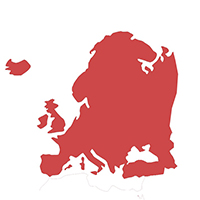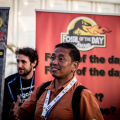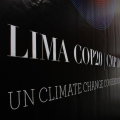Bonn, Germany – The next step in reaching the Paris 2015 global climate change agreement commences today in Bonn, Germany at the latest round of UN climate change negotiations.
Standing on the heel of a historic month for climate talks, there is palpable momentum for reaching a climate change agreement. The Intergovernmental Panel on Climate Change (IPCC) has recently released its fifth assessment underpinning the human role in climate change and global scientists have concluded that irreversible melting of Antarctic ice sheets is underway. Yet, two of the world’s largest emitters – the US and China – provided welcoming news on emission reduction schemes, and important developments have been made on the Green Climate Fund.
In attendance at Bonn are government negotiators and 43 national ministers who are tasked with dual goals this session: providing political direction on the design of the Paris climate agreement and providing insight on their ambitions for raised ambitions on reducing emissions before 2020, when the Paris agreement will come into force. NGOs have been highly critical of the low number of ministers planning on being present at the negotiations.
Much of the focus is on the Ad-Hoc Working Group on the Durban Platform for Enhanced Action (ADP), the body tasked to raise the emission ambitions and design the new agreement. Ministers will present the ADP with their nationally determined contributions for the Paris 2015 agreement and participate in the construction of text’s elements and structure. Throughout Bonn, the ADP will hold technical sessions for the parties on practical policies and actions for further mitigation and adaptation to climate change. This will occur concurrently to the Subsidiary Body for Scientific Technological Advice (SBSTA) and the Subsidiary Body for Implementation (SBI).
A secondary discussion within these bodies will see the full implementation of the Kyoto Protocol in its second commitment period. Trust in laying a meaningful role in climate change action will be determined through this, particularly for the developed countries.
The second week will see a forum for cities, which aims at harnessing the potential for the urban environment and various land uses to join the climate change discussions and safeguarding their future.
Here’s our wrap of some NGO demands for Bonn:
– Build on the momentum of climate action by drafting an initial text for the Paris 2015 agreement. This includes finalising the nationally determined contributions (NDCs) and agreeing on the instruments for communication that will be used to transfer information required by the NDCs. A draft will open the path to success in Ban Ki Moon’s Climate Summit in September 2014, allow for real negotiations in COP20 Lima, and reach the goal of an agreement in Paris.
– Developed countries must signal their commitment to climate change action and priorities the issue of adaptation and protection of the most vulnerable. On the first day of talks, it is already loud and clear that there is great concern amongst the Less Developed Countries and Small Island Developing States at the depleting financial resources for climate change mitigation and adaptation. This is the opportunity for the developed countries to show their commitment to climate action by mobilising resources for the newly minted Green Climate Fund, which will bring action sooner rather than later.
– International network of environmental NGOs Climate Action Network (CAN) is urging the the acknowledgement that there must be a complete transition from fossil fuels to renewable energy.













comment